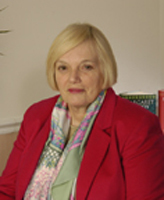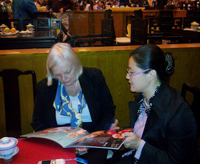
October brought with it the experience of a lifetime for Margaret Doody, the John and Barbara Glynn Family Professor of Literature and the first director of the Ph.D. in Literature Program. She spent the better part of the month in Singapore and China delivering lectures about the novel, women novelists, and the Enlightenment.
Her trip began with a weeklong visit at Nanyang Technical University in Singapore and was followed by two weeks in China, where she lectured at Beihang University and Peking University in Beijing. Professor Doody is best known in China for her monograph The True Story of the Novel, in which she references both Chinese and Western fiction. Her lectures were based on some of her previous and current work on the novel, in addition to the mystery novels she writes. Topics included The True Story of the Novel Revisited and Characters in Novels.
Doody's Beijing itinerary entailed a total of six lectures and several roundtables and meetings, at which, she says, “They really worked me quite hard,” keeping a video camera running the whole time to document her trip. Professor Doody is pleased she was able to introduce Jonathan Noble, head of Notre Dame’s Asia Center in Beijing, to the dean of the School of Foreign Languages, a college of Beihang.
The most challenging part of the lectures and roundtables, Doody says, was the language barrier. Some of the students she interacted with did not know English well, but they were all eager to practice and learn. Her main concern in communicating her ideas with them was that some would lose the meaning of what she was saying. Otherwise, she found that the university setting there is similar to that in the United States, with only a few cultural differences.

For example, Chinese professors and students are interested in Western methods of teaching. Professor Doody told them that we, too, once took for granted the traditional lecture format in which the instructor stands before rows of seated students, but that we now desire the flexible classroom allowing for group discussions, film reports, and dramatic readings.
Academic vocabulary differs in interesting ways, as well; they seem to be inventing a new vocabulary to deal with new times and ideas. Instead of words such as “debate” and “argument,” they prefer “sharing,” a word they think is more “democratic” and less combative. Overall, she found the students there to be determined, bright, and forward looking. They have hope for the future and could contribute a great deal to the world, she says.
In addition to her activities at the universities, Doody visited a number of sites and immersed herself in the culture in a way that made a big impression on her. She ate the most wonderful Chinese, Japanese, and Korean food; saw the set for the television film version of The Dream of the Red Chamber, one of her favorite Chinese novels; attended the Peking Opera to hear traditional performances (pictured below); and walked on the Great Wall.
The Wall was the most memorable of these places, she says, and she describes it as startling in real life. It is “a giant structure going on like a great, white worm” over hills and mountains as far as the eye can see. What film cannot capture, she remarks, is the “soaring space” and the view through “layers of mountains.”
Doody says she was lucky to be there on a clear, sunny day, because Beijing has much more smog than Los Angeles. While huge, the city lacks the kind of city center found in New York, Paris, and London. It is driven by industrial progress, much like Victorian London, and although it is not pretty, it is full of life.

Doody’s experiences inside and outside of the university left her with a real sense of China and an affection for it so stong that she still beams with excitement when talking about it. In fact, the trip had such a deep impact on her that she wants to encourage everyone to learn some Chinese and go to China because of its importance in the world and its vast and beautiful territory.
Now that Professor Doody has returned home, there is talk about publishing her lectures in Chinese—and some of the research she produced for these talks will play a role in a book she is writing about characters in novels. This book examines both how different cultures view characters and what these characters can tell readers about a particular nation or group.
The main character in The Dream of the Red Chamber, Dai-yu, for example, has a temperamental, witty, and creative character, one that does not give in to Confucian obedience and reflects a culture that has a great deal going for it. A culture’s anxieties, likewise, tend to manifest in characterizations, and Doody’s book will explore how this phenomenon occurs.
In addition, Doody says she looks forward to finishing another book on the names of characters and places in Jane Austen’s novels, adding that it will be fascinating to see how the lasting effects of a Chinese tour make their way into her work on Western literature.